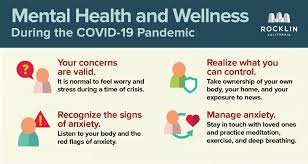Social Isolation and Its Effects on Mental Health
www.rocklin.ca.us/article/mental-health-month-covid-19-and-mental-health

September 18, 2020
At the beginning of 2020, COVID-19 caused a global quarantine, leading to scientific research on how isolation impacts mental health.
People all over the world are now facing the consequences of an unexpected shutdown beginning earlier this year; the respiratory virus has provoked a high increase in unemployment and a sense of loneliness as a result of social isolation caused by lockdowns issued in early March.
Fifty-three percent of adults in the United States have polled that the coronavirus has harmed their mental state due to anxiety and stress caused by an increase in unemployment with a three percent overall rise in mental health issues induced in adults from the coronavirus pandemic.
Social distancing guidelines along with issued mask mandates cut all ties with social gatherings for a lingering six months, followed by orders putting a halt to any gatherings consisting of 10 or more people. Minorities and adolescents have reported feelings of anxiety, depression, stress, low self-esteem and despair as a result of governmental orders.
Studies have shown that as a result of quarantine, 22.6 percent of students reported symptoms of depression and 18.9 percent of students have developed feelings of anxiety. This continuing change in their daily routine and social lives has vastly heightened the frequency of these specific mental illnesses, having a major effect on their lives.
High-schooler, Skye Csulik, stated that the COVID-19 pandemic has impacted her social construct and has increased anxiety over the safety of her family and friends’ health. She mentions that “I have struggled with slight anxiety trying to figure out online school and it became stressful when I would procrastinate.”
As the COVID-19 pandemic continues, more awareness of the virus’s effect on mental health has been brought to the media such as anxiety and bipolar disorder, which are now being addressed as an issue that can be discussed.
Many have seen more benefits of the coronavirus on mental health than a negative impact. Being socially isolated has had many benefits on students who have transitioned from in person learning, to online.
Resulting from school shutdowns, followed by ordered lockdowns in various places, social pressure and anxieties of stress over classwork were majorly cut down for students. Especially in middle and high schools, students feel pressured by their peers in order to fit into a certain set of standards from the activities they participate in, to what they wear. Moving to a contactless learning environment through the internet has cut the stress of many teens.
A local teenager, Victoria Wortham, claimed that COVID-19 has improved her struggles with anxiety and stress in school. Victoria says that “being socially isolated has helped me figure out who I really am. There’s no social pressure or influences that I need to conform to in order to “fit in”.
The coronavirus has both negatively and positively impacted adults and minorities who struggle with mental health. As the wait continues for a possible solution to the virus, people are finding ways to cope with newly developed mental issues as well as looking at the benefits of social isolation.


